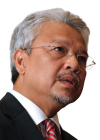
Malaysia may once have enjoyed the prestige of being one of the fastest growing economies in south-east Asia, but the global economic downturn dented its export-dependent economy in several ways, jeopardising its ambitions of becoming a developed nation by 2020.
“Last year we saw our exports drop 20%,” said second finance minister Ahmad Husni Hanadzlah at the Asian Financial Forum in Hong Kong in January.
Advertisement
For October to December 2009, exports experienced an upturn – which is likely to have occurred due to a surge in demand brought about by the holiday season. The minister expects Malaysia’s growth to continue to improve, albeit by about 3% this year.
Nevertheless, Mr Ahmad Husni emphasised in an interview with fDi that Malaysia is trapped in a low-value-added, low-wage and low-productivity structure. Its service sector is underdeveloped, private investment is half the level prior to the 1997/98 Asian crisis, and the manufacturing sector is suffering from lack of investment.
“The [need for] transformation is particularly urgent when we take the external environment into account,” he said.
The minister also pointed to a worrying trend: Malaysia’s oil reserves are expected to last for only another two decades.
Malaysia has enjoyed the position of being the number one producer of petroleum in the South China Sea, accounting for more than one half of the production in the region. In 2008, it represented an excess of 40% of the government’s revenue, and exceeded 37% the year before.
The minister warns that Malaysia could become a net oil importer by 2011. “The relative increase of the oil and gas dependence, versus contribution from the other economic sectors, effectively means that the rest of our economic activities have not grown by much, if at all,” he said.
Advertisement
Necessary investment
Consequently, Mr Ahmad Husni revealed, the government is assessing its manufacturing sector for the possibility of guaranteed government loans so that companies can complete projects. “We are looking for debt to provide opportunity and invest in our future,” he said.
But the minister added that the government is not interested in burdening the country with stimulus money.
As a result, Malaysia’s government is now directing its economy towards high-value manufacturing, and is set to launch its new Five Year Plan focusing on this model this year.
Following on will be the 10th Malaysia Plan, which aims to ensure that all efforts towards economic recovery in the country run smoothly. Part of that effort will focus on pushing Malaysia’s economy to the private sector through more public-private partnerships.
Among the sectors on which the country plans to concentrate are finance, tourism and high technology, including environmental technologies. Malaysia’s reputation as a burgeoning global hub for Islamic banking is also giving it an advantage in establishing ties with wealth centres in the Middle East.
In January, the 1Malaysia Development Berhad strategic development company signed an agreement with the United Arab Emirates’ Mubadala Development Company to focus on renewable energy, sustainability and possible clean-tech projects and investments. This may include building Malaysia’s first carbon-neutral city. It also intends to co-operate and invest in carbon reduction projects and clean-tech venture capital.
Curriculum Vitae
Ahmad Husni Hanadzlah
2009Government of Malaysia
Second finance minister
2004Government of Malaysia
Deputy minister of international trade and industry
1984Perak State Islamic Economic Corporation
General manager